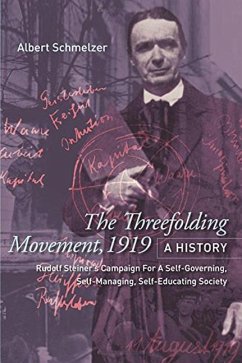Following World War I, Germany faced a period of revolutionary upheaval and general unrest. In the midst of these tumultuous events, Rudolf Steiner's pioneering movement for social threefolding rallied around a unique conception. Its three principal goals were to promote human rights and equality in political life, freedom in cultural life and associative cooperation in economic life. Albert Schmelzer's engaging yet rigorous study, the most complete to date, recounts the movement's practical attempts to bring about social threefolding in 1919, giving lively descriptions of the principal characters involved. Apart from this detailed history, The Threefolding Movement, 1919 offers an accomplished synthesis of the development of social thought and the complex politics of the day. Schmelzer presents his study of threefolding within the context of evolving social ideas, comparing Steiner's relevance to key political and cultural thinkers, reformers, and radicals. Steiner emerges as a social innovator who was actively involved in the revolutionary situation of 1919, although he rejected violence and was a consistent advocate of democracy. A cursory analysis might suggest that Rudolf Steiner stood at the left of the political spectrum, but Schmelzer shows how his social ideas transcend the right-left divisions and polarizations of contemporary politics. Social threefolding is truly a new approach to human development--a fresh way to understand society that allows a more creative and harmonious future.
Hinweis: Dieser Artikel kann nur an eine deutsche Lieferadresse ausgeliefert werden.
Hinweis: Dieser Artikel kann nur an eine deutsche Lieferadresse ausgeliefert werden.








